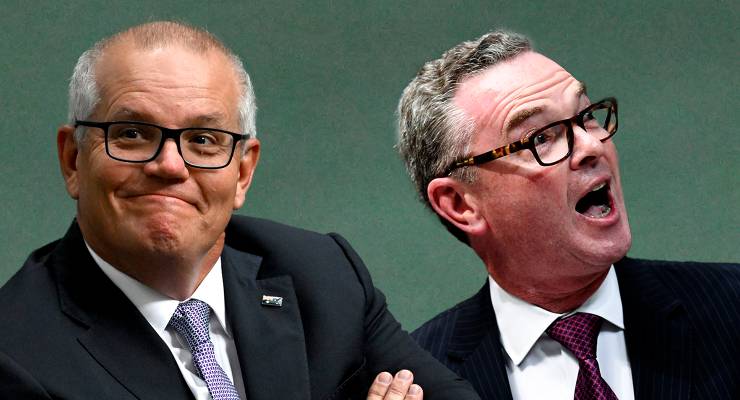
Former prime minister Scott Morrison’s announcement that he’s set to join DYNE Maritime, a venture capital firm focused on emerging military technologies, makes him the latest politician to take business opportunities related to AUKUS.
Of all the former MPs and senators who have become involved in private AUKUS business, Morrison might be the one with the closest connection to the subject matter: he was responsible for creating the defence pact alongside US President Joe Biden and former UK prime minister Boris Johnson. But others on Crikey’s list have had very close access to AUKUS decision-makers as well.
Morrison
The former Liberal leader who is retiring from Parliament has confirmed he’s set to join DYNE Maritime, a $157 million fund launched in October with the aim of investing in dual use technologies — inventions that have military and civilian applications. According to The Australian Financial Review, DYNE Maritime has its sights set on technologies related to AUKUS.
Morrison, one of the leaders who launched AUKUS in 2021, told The Australian he will be strategic adviser to the firm, alongside former Trump administration secretary of state and CIA chief Mike Pompeo. He will also take another job alongside a different former Trump adviser: Morrison has been hired as the vice-chair of American Global Strategies, headed by former US national security adviser Robert O’Brien.
Arthur Sinodinos
As Crikey reported last week, the recent US ambassador and former Liberal industry minister has joined an outfit called AUKUS Forum. As co-chair of the business networking group, Sinodinos has been criss-crossing the country to promote business opportunities for regional companies aimed at “unleashing the regional power of AUKUS”. As Australia’s ambassador in Washington until early last year, Sinodinos was around for the formation of AUKUS and has posted to LinkedIn a picture of himself and Biden in front of an AUKUS banner.
Joel Fitzgibbon
Fitzgibbon, a former Labor defence and agriculture minister, is the other co-chair of AUKUS Forum. He described the project in a LinkedIn post as being aimed at “maximising Australian industry participation in the AUKUS pact”. A Labor old-timer in Parliament from 1996 to 2022, and having been in cabinet alongside some current key ministers, Fitzgibbon has lots of useful connections in Canberra. Among his post-politics social media posts are pictures where he poses with Defence Industry Minister Pat Conroy.
Christopher Pyne
The former Liberal defence minister raised eyebrows in Canberra when he began taking defence consulting work in 2019, immediately after leaving Parliament. Since then AUKUS has made private defence businesses boom, and Pyne hasn’t slept on the opportunity. Last April, his lobby firm Pyne & Partners funded a bipartisan junket to Washington DC and New York, where the likes of Liberal Senator James Paterson and Labor MP Meryl Swanson were introduced to key US defence figures, as reported by The Sydney Morning Herald. Crikey has previously chronicled Pyne’s AUKUS-linked business interests.
Joe Hockey
Another former Liberal cabinet minister and US ambassador, Hockey has extensive networks in both DC and Canberra that are useful for taking advantage of AUKUS. The ex-treasurer’s Bondi Partners advisory firm reckons “the opportunities for businesses on both sides of the Pacific Ocean will increase significantly” given the increased defence collaboration between the US and Australia. Just months after Morrison’s initial AUKUS announcement, Hockey and investment firm Ellerston Capital launched the 1941 Fund. As The Australian put it in a gushing article announcing the initiative, it’s “Australia’s first pure private investment play into national security … [backed by] a group of high-net-worth patriots from the US and Australia looking to put big licks of private capital behind dual-use technology in defence, intelligence, cyber and space, as well as commercial uses”.
Is it morally and/or ethically wrong for politicians to benefit like this? Let us know by writing to letters@crikey.com.au. Please include your full name to be considered for publication. We reserve the right to edit for length and clarity.








There really should be a ban on any minister taking up employment with any organisation that fell within their ministerial portfolios until a decent period has passed. I’m thinking 10 years.
Considering we’re paying ex PMs for the rest of their life I would suggest the ban should be for life. To do otherwise encourages inappropriate behaviour whilst in office.
…and, if they do then there’s no need for a parliamentary lifetime pension
Pay them out and ban them.
The money’s worth it.
How about a total ban on post-office appointments forever?
They can retire and we pay them a generous pension indefinitely.
Whatever the figure it would save us money in the longer term (not that it matters for the federal budget).
I’d settle for one or the other, but not both: retire on a very, very generous pension, or keep earning where you like. Just not both!!
If you cut a submarine in half lengthways it might just make a big enough trough to accommodate all of the ex-Canberra snouts.
Ministers clearly recognise that the more wildly expensive a project is, the more chance some of the ocean of cash will find its way into their capacious pockets. Here we see the happy grubs wallowing in the AUKUS trough of billions, and similar rewards no doubt await those who are campaigning for nuclear power in Australia, if they win (far more chance of rich rewards there than with those nasty cheap renewables). But there are plenty of lesser examples too, with Defence being a good place to start looking.
These shameless examples of exploiting their public positions for self-enrichment would, however, be near enough acceptable if the projects they inflicted on the nation were actually any good. The real scandal is that the projects tend to be misconceived or unnecessary, amazingly expensive to begin with, then afflicted with huge cost over-runs, delivered many years late or not at all and finally fail to meet some or all of their basic performance measures — happily, by that time those responsible all moved on long ago. This has become so routine it is hardly noticed.
Too true!!!
This read like another episode of Utopia.
I’m reminded of the Yes, Minister episode in which Jim Hacker realized that he was becoming a moral vacuum. One way to spot the moral vacuums in politics is to see what they do after leaving it – working for or with the merchants of death is a pretty good indicator (there is also lobbying for fossil fuels, gambling, the big banks… ).
Well said, Andrew!
Very true. It would cheer me up to see an article on ex-politicians who’ve done something good after politics.
There’s British politician John Profumo, who resigned his seat in 1963. It’s a start…
Malcolm Fraser!
Julia Gillard is working to improve gender equality of education around the world. This is laudable. When females are educated then they have choices… to make their way independently, instead of being a brood mare to a male. It goes a long way to lowering the birth rate as a side bonus. Women who have choices often choose to have fewer children later, or none at all.
These sound like additional reasons to cancel AUKUS and revert to buying French subs. If we do that we can either go back to the diesel-electric version of France’s Barracuda class nuclear subs, or just plain get some Barracuda nuclear subs.
And we might actually be able to get enough staff for them. These massive nuclear subs that stay at sea for ridiculous amounts of time are not going to be the preferred workplace for many. We couldn’t staff the Collins class ones, much smaller needing less people and less restrictive on family life.
Maybe this would help: make it mandatory for all those who set up AUKUS to serve several years as the crew of the first submarine, or if there’s some doubt about their skills being sufficient for that, just put them in as ballast.
This idea has some precedent. The British airship R101 was a controversial government project that first took to the air in 1929. (Just as nuclear-powered submarines are supposed to be so much better because of their comparitively much greater endurance, so the range of an airship could be much greater than a fixed wing aircraft. The R101 and similar airships would, it was thought, be wonderful for linking the UK to its far-flung empire, including Australia.) The British press wittily called the gigantic R101 ‘the Titanic of the skies’. The British cabinet minister who ordered its construction, Lord Christopher Thomson, was so convinced of the merits of his R101 that he insisted on being aboard the first international flight, from the UK to Karachi (then India, now Pakistan) in October 1930. The R101 crashed in France, with only 6 survivors out of 54 on board. Thomson was among the dead. Whatever one thinks of the R101, Thomson’s commitment and good faith cannot be doubted.
Neville Shute worked on both the R100 and R101 airship projects and has much to say about them in his 1954 book Slide Rule. There are other Australian connections to the R101.
Fascinating, I had not heard of that. Reminds me that the chairman of the White Star Line was on the Titanic when it hit the iceberg. He was dubbed the ‘coward of the Titanic’ because he got a seat on a lifeboat, ahead of lots of women and children. Off topic..
The R101 was built by a government committee, and was a disaster which helped kill the industry. The R100, private enterprise, was a success. British aerospace history is littered with such stories – TSR2, Blue Streak, Concorde, Comet.
Indecision, promoted by US and UK “advisers” on the method of propulsion and therefore hull design, gave the French no chance of making modifications in a timely way. Barracuda-class nuclear subs could have been coming off the production this decade, avoiding the valley of death for Osborne.